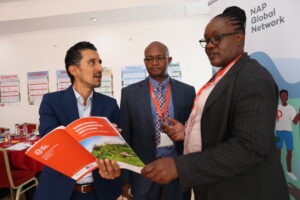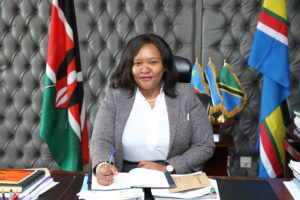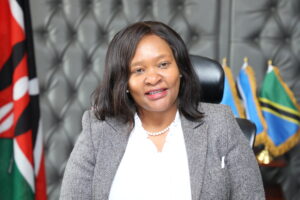
By Melisa Mongina.
Kenya has hosted delegates from ten developing countries across three continents who gathered to exchange insights on strengthening multilevel governance for enhancing climate change resilience through national adaptation plans (NAPs) in their Peer Learning Summit.
During this three-day summit, which transpired in Nairobi on Wednesday, participants expressed their intent to execute the plan, emphasizing the inclusion of vulnerable sectors and communities.
In an interview, Dr. Pacifica Ogola, the Director for Climate Change at the Ministry of Environment, Climate Change and Forestry, noted that in terms of vertical integration, they involve all the ministries at the national level and all the counties they consider as essential in implementing adaptation, primarily because their constitution devolved most of the vulnerable sectors.
“And currently we are developing our third national climate change action plan, which has a separate adaptation technical analysis report, delving into the details of each plan and how these plans will be unpacked and implemented at all levels across the government and also by civil society organizations and the private sector,” said Dr. Ogola.
She adds that they are ensuring that the plans will be gender mainstreamed to enable youth and vulnerable communities to contribute to the plan.
Dr. Ogola highlights that they also have programs around climate-smart agriculture, ensuring that the integration happens, and they have a program on financing locally led adaptation funded by multiple partners.
“Over and above this, we also have programs around climate-smart agriculture, ensuring that this integration happens. We have the program on financing locally led adaptation, funded by multiple partners,” she notes.
According to her, they have made sure that the plan takes into account the process from the village level to the governor’s office and the relevant sectors of the national government.
“And we make sure that this plan takes into account the process from the village level all the way to the governor’s office, to the relevant sectors of the national government. So there are different components of programs across different ministries and governments, which are not coordinating this process at the national level, but we make sure that these programs integrate and report back to us, and this information is stored in our monitoring, reporting, and verification system,” adds Dr. Ogola in an interview.
She emphasizes that vertical integration is essential in Kenya, and they have involved all the relevant ministries, sectors, departments, including the national treasury and the planning department, to ensure that all adaptations are mainstreamed in the overall plan.
“We also make sure that all our plans are included in the national climate change action plan. So the national climate change action plan is the tool we use to consolidate both the mitigation plans and the adaptation plans. The adaptation plans are informed by our national adaptation plan. And how do we ensure this integration happens? We work very closely with the county governments. We also work closely with the departments, with the sectors,” said Dr. Ogola.
Mauricio Luna-Rodríguez, NAP Global Network’s policy advisor and climate change adaptation governance expert, stated that there is a need to take action on the climatic impacts by supporting local community adaptation to climate change.
“And because climate change is exacerbating all of these climatic impacts, we need to take action on these; we need to support the local communities to face climate change,” said Mauricio Luna-Rodríguez.
Mr. Luna adds that national governments have been putting policies in place to move forward on climate change adaptation and they want to ensure that the policies being implemented are discussed during the three days on how to better coordinate from the national level to the subnational level and how to incorporate different actors in this process of adaptation around the national adaptation plans.
“But there is a realization that when those policies are being implemented, you need to coordinate with the subnational governments, the local communities, and different actors, both civil society organizations, the private sector, academia, and this is basically what we want to discuss during these three days on how to better coordinate from the national level to the subnational level and how to incorporate different actors in this process of adaptation around the national adaptation plans,” said Mr. Luna.
The summit focused on “vertical integration” in adaptation, the process of linking sub-national and national adaptation efforts. Vertical integration in multilevel governance is key for effective, representative, and inclusive NAP processes.
According to Mauricio Luna-Rodríguez, their fundamental step in moving from planning to implementation of the NAP process is vertical integration, and they will concentrate on the crucial aspects of the process in the summit.
“Vertical integration is a fundamental step in moving from planning to implementation of the NAP process. In this summit, we will discuss crucial aspects of this process, such as the importance of establishing institutional arrangements for vertical integration across all levels of governance, as well as how to facilitate financing to sub-national levels to enable them to articulate and implement their local priorities,” said Mauricio Luna-Rodríguez, NAP Global Network’s policy advisor and climate change adaptation governance expert.
The Peer Learning Summit has been co-hosted by the Kenyan government and NAP Global Network and it took place from October 11 to 13. The Summit convened adaptation experts, including national and sub-national government officials from Belize, the Dominican Republic, the Democratic Republic of the Congo, Eswatini, Ethiopia, Ghana, São Tomé and Príncipe, Tuvalu, and Zimbabwe, as well as representatives from Kenya.












